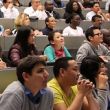Annual CSR conference: business ethics: ethics or business?
“… we need to inspire others,” believes Rob Kragt, Marketing Manager at Desso. Speaking at the 12th edition of the annual CSR conference at Maastricht School of Management, Kragt stressed the importance of sharing his knowledge on CSR with the MBA students at MsM.
‘Corporate Social Responsibility and Ethics’ forms an integrated part of the MsM MBA curriculum. As such MsM organizes an annual Corporate Social Responsibility conference to allow its MBA students to engage in discussions on this important topic with representatives from the European business community.
The event benefits both parties. On one hand, the students learn and interact with members of companies or industries, which are active in the students’ countries. On the other hand, the guests from the business community learn from the students’ questions and professional experiences.
This year’s conference focused on the question “Business Ethics: Ethics or Business?” and featured representatives from Sabic, IKEA, Triodos, Obvion NV, Rotterdam Business School and Desso.
After warm words of welcome and introduction by Prof. Aad van Mourik, Director Education MsM, the business representatives gave workshops on and shared experiences about CSR practices from their companies and organizations.
In his case Business Ethics and Politics Marko Korac from Rotterdam Business School took the recent CSR debate in the Dutch parliament as a starting point for the discussion with the students. In the parliament’s debate there was a difference of opinion on whether Dutch companies operating in developing countries should apply the same CSR practices abroad as in their domestic market. “MsM students are able to relate better to this issue because they come from many different countries. The fantastic education they receive at MsM enables them to use the theory and apply it to this burning issue. This stimulated a very interesting debate in the classroom. What was very obvious was that because of their different background, the students had a very different interpretation of what it means to be ethical in business. This contributed to the quality of debate and students came to me with very positive feedback”, Korac said.
Rob Kragt from Desso highlighted a specific aspect of the triple Ps (People, Planet and Profit) of CSR: the Planet component. Desso has made the strategic choice to become a Cradle 2 Cradle producer. According to the Cradle to Cradle® principles devised by Michael Braungart and William McDonough, products are made from pure components that are easy to disassemble, so that new products can be made from them (= up-cycling) both in the biosphere and the technosphere. For Desso It is not only good for people & planet – it is a business building opportunity.
In Sabic’s case Danielle Willems, Manager Manufacturing Communications Europe, discussed the project ‘Let’s really talk plastics’. With this project Sabic aims to change people’s perceptions of plastics as undeniable environmental pollutants and create awareness of the solutions that plastics can provide for global needs such as food security (less food waste through packaging), reduction of CO2 emissions by developing light weight products (use of plastic fibres in the automotive industry that have made cars become much lighter) or enabling alternative energy sources (such as solar cells).
In the case presented by Triodos, the students were challenged to put themselves in the shoes of David Harleman, Senior Investment Officer Emerging Markets and answer the question on what they would look at when making an investment decision. Harleman said that he enjoyed giving the workshop. “We had a great group of international students coming from all different countries and we had a really lively debate. We engaged in interesting discussions with different perspectives on how to balance having a real social and environmental impact in communities in which you are active on one hand and on the other hand doing good business and having a smart business model so you don’t have to rely on subsidies. It was very interesting to listen to all the experiences from abroad. Personally I learned a lot from the students. I think it is very important to our company but also for other companies to connect with students as, some of them could become future employees or even clients.”
At Obvion CSR is anchored in the heart of the company. Obvion, founded in 2002 and a 100% subsidiary of Rabobank, functions as a mortgage originator, more particular for mortgages ‘with a conscience’. Douwe Dijkstra, Deputy Director in New Business Development and Michelle van Pol, New Business Developer, focused on the following questions during their workshop: When implementing CSR in your company how far can you (should you) go in committing all stakeholders to your views? And how much space can you or will you allow for deviation of your policy? And if so, by whom?
David Loozen, Marketing Manager at IKEA Heerlen shared IKEA’s view on sustainable business and elaborated on IKEA’s sustainability strategy “People & Planet Positive”. With this strategy IKEA aims to use sustainability to drive innovation, transform their business, shape their investments and unleash new business opportunities.”We can change the world if we can do it in small steps”, Loozen stated. His colleague Jeanine Huijbregts, Food and Beverage Manager at IKEA, appreciated the fact that she learned that there are many more views than just the European one.
MsM MBA student Abdul Nasiru Iddrisu Alhassan from Ghana summarized the value of the conference for the students as follows: “We all are potential managers and sooner or later we will be faced with CSR issues. Based on today’s interactive workshops we will be able to develop better concepts for CSR”.
Watch the pictures of the CSR conference on Flickr or Facebook and click here to see a video compilation of the conference.

